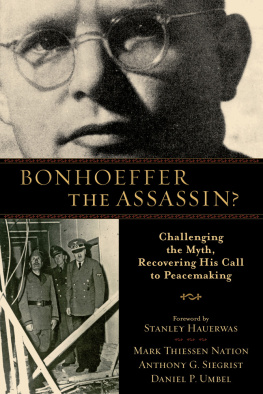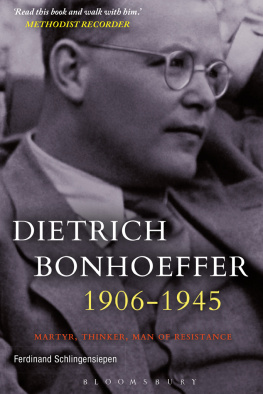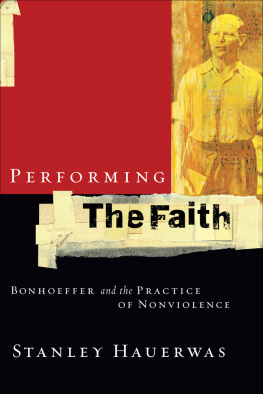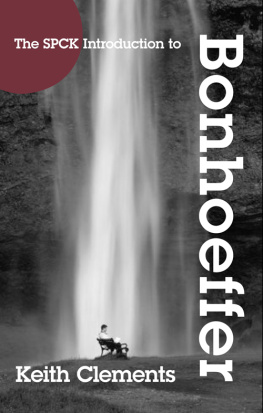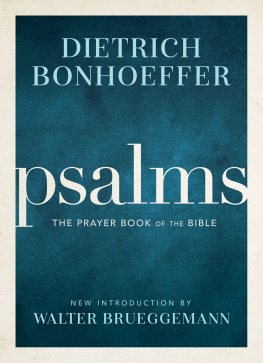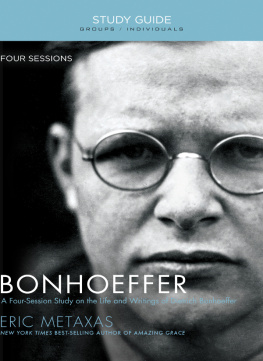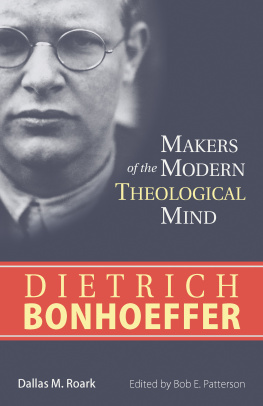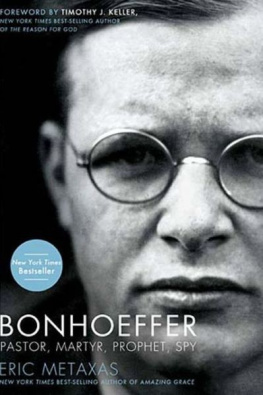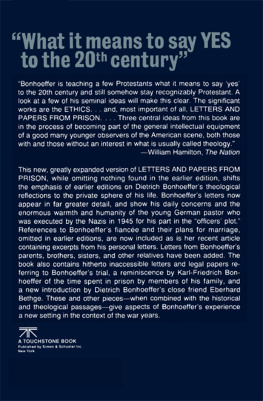
2013 by Mark Thiessen Nation, Anthony Siegrist, and Daniel Umbel
Published by Baker Academic
a division of Baker Publishing Group
P.O. Box 6287, Grand Rapids, MI 49516-6287
www . bakeracademic . com
Ebook edition created 2013
All rights reserved. No part of this publication may be reproduced, stored in a retrieval system, or transmitted in any form or by any meansfor example, electronic, photocopy, recordingwithout the prior written permission of the publisher. The only exception is brief quotations in printed reviews.
Library of Congress Cataloging-in-Publication Data is on file at the Library of Congress, Washington, DC.
ISBN 978-1-4412-4260-0
This extensively researched and passionately argued book will invariably provoke discussion in Bonhoeffer studies as it challenges misconceptions of his role as assassin and patriot. It persuasively reconciles Bonhoeffers pacifist writings with his political activities in the Abwehr, as well as themes of pacifist obedience with political responsibility often separated by Niebuhrian political realist readings. This is an invaluable study of Bonhoeffers theological ethics that must be taken seriously.
David Haddorff , St. Johns University
Those of us who have been uneasy with the too-glib assumption that Bonhoeffer gave up his commitment to pacifism to join a conspiracy against Hitler can now rejoice. This books careful scholarship thoroughly proves that the major change in Bonhoeffers theology happened much earlier and that he remained steadfast thereafter as a pacifist until his death at Nazi hands. This clarifying volume must be read by everyone.
Marva J. Dawn , theologian, lecturer, and author of The Sense of the Call , Unfettered Hope , and Being Well When Were Ill
This books provocative title is designed to challenge the received view of Dietrich Bonhoeffers role in the German Resistances plans to overthrow the Nazi regime by murdering Hitler. The authors seek to show that he had no sympathy with such political violence. Instead he remained true to the teachings of the Sermon on the Mount, especially to Jesuss teachings about the ethics of peace, which he had outlined so forcefully in his book The Cost of Discipleship . Their careful analysis of Bonhoeffers writings finds no evidence that he endorsed tyrannicide. They make a strong case for a re-evaluation of his legacy.
John S. Conway , University of British Columbia
In memory of Franz Hildebrandt (190985), Bonhoeffers best-informed and most like-minded friend
(Eberhard Bethge)
Contents
Cover
Title Page
Copyright Page
Endorsements
Dedication
Acknowledgments
Foreword by Stanley Hauerwas
Introduction
Part 1: Bonhoeffers Biography Reconsidered
1. Pacifist and Enemy of the State
2. Seeking a Legitimate Christian Means of Fighting Hitler
3. Dietrich Bonhoeffer, the Assassin?
Part 2: The Development of Bonhoeffers Theological Ethics
4. Dietrich Bonhoeffers Amoral Ethics: An Extremely Awkward Undertaking Never Again Attempted
5. Obedience to Jesus Christ: Narrating Gods Command in Bonhoeffers Discipleship
6. The Penultimate and the Ultimate: Negotiating the Discipleship Tradition in Ethics
7. Everyone Who Acts Responsibly Becomes Guilty: Contested Themes in Ethics
Conclusion
Notes
Bibliography
Index
Back Cover
Acknowledgments
T his work is, we hope, a coherent monograph written by three authors. Mark has served as the overall editor to ensure coherence (with help from Anthony). Individual chapters were divided up among us. Mark wrote the introduction, the first three chapters, and the conclusion. Dan wrote chapters 4 and 5. Anthony wrote chapters 6 and 7. We are all thankful for the assistance of a variety of people. The list below is surely incomplete.
From Dan . I would like to thank both of my coauthors, without whose help my own chapters would have never reached press. Thanks are due especially to Mark for his encouragement, insight, and frequently exercised patience. Thanks are also due to my friends and family for their support, encouragement, and understanding, especially to my parents, my congregation at Mt. Olivet Church, and my beloved wife, Tonya, who came into my life when I needed her most.
From Anthony . I would like to thank Sarah, Dave, Dorothy, and Jeff. This book has been germinating for a long time. The four of you have kept me hopeful that it would one day be completed. Some twelve years ago Oz Lorentzen assigned Bonhoeffers Ethics to a small class of undergraduate theology students. I am thankful for his ambition. A number of my students here at Prairie read early drafts of the project and took the argument seriously despite the fact that it went against the current of much of the secondary literature they were reading at the time. At the Toronto School of Theology Jim Reimer allowed me to explore some of the lines of argument developed here in a course he taught on War and Peace in the Christian Tradition. His comments were helpful. Finally, I am grateful to Mark for the idea of the book and for his sustained attention to the subject matter over the years that the project has been in development.
From Mark . I have been studying this set of issues for a long time. I am grateful to LeRoy Friesen, himself a Bonhoeffer scholar, who more than thirty years ago directed my masters thesis on nonviolent forms of resistance within Nazi Germany at Associated (now Anabaptist) Mennonite Biblical Seminary. I am grateful to John Howard Yoder for allowing me to write a long paper for him on the Confessing Church out of the same research. I am also grateful to have been able to attend the American commemoration of the 50th anniversary of the Barmen Conference in April 1984 in Seattle, Washington. There I had the opportunity to hear speeches from one of the original signers of the Barmen Confession, Heinrich Vogel, along with Bonhoeffers close friends and (with the latter two) former students, Franz Hildebrandt, Eberhard Bethge, and Wolf-Dieter Zimmermann. At the beginning of the 1990s Jan Ligus, visiting Bonhoeffer scholar from the Czech Republic, offered me a directed study course on Bonhoeffer at Christian Theological Seminary. A few years later, Ray Anderson agreed to do another directed study on Bonhoeffer at Fuller Theological Seminary.
More immediately pertinent to the book, a sabbatical at Eastern Mennonite Seminary in 200910 allowed me to do substantial research on attempts on Hitlers life while examining the relevant facts about Bonhoeffers biography that might or might not connect with these attempts. I am grateful for that. I am grateful to the students who have been in my Bonhoeffer classes here at Eastern Mennonite Seminary, especially in spring of 2011 when we used early versions of chapters of the present book. Esther Lanting loaned me her notes from interviews she conducted with friends and family of Dietrich Bonhoeffer in Europe in the mid-1970s. She spoke with them specifically about his pacifism and possible involvement in attempts to kill Hitler. David Graybill improved my three biographical chapters by offering his expert editorial help.
My wife, Mary, has been very supportiveas alwaysduring my years of working on this book; thank you. She and the interesting life of our local Mennonite church, the Early Churchwhich is connected with and meets in a community center that serves some of the poorest people in Harrisonburgregularly remind me that costly grace and the discipleship flowing from it are not simply words appearing in a book written in 1937, or lived only ages ago; they are still realities still being embodied.

